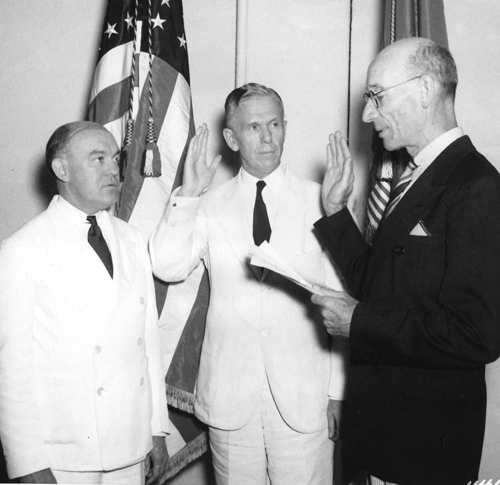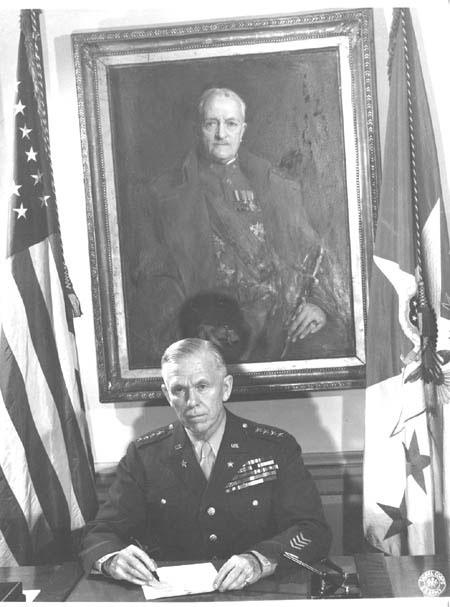 August 31, 1943, was the last day of General George C. Marshall’s 4-year appointment as chief of staff of the U.S. Army. On the day he had been sworn into office, September 1, 1939, Germany had invaded Poland, marking the start of World War II in Europe. A little more than half way through Marshall’s appointment, the United States entered the conflict following the Japanese attack at Pearl Harbor on December 7, 1941. Initially, Marshall’s work as chief of staff focused on hemispheric defense and ensuring the army was prepared to fight, if needed. Following the entry of the U.S. into the war, Marshall shifted his attention to mobilizing the army and setting the strategy to defeat the Axis powers.
August 31, 1943, was the last day of General George C. Marshall’s 4-year appointment as chief of staff of the U.S. Army. On the day he had been sworn into office, September 1, 1939, Germany had invaded Poland, marking the start of World War II in Europe. A little more than half way through Marshall’s appointment, the United States entered the conflict following the Japanese attack at Pearl Harbor on December 7, 1941. Initially, Marshall’s work as chief of staff focused on hemispheric defense and ensuring the army was prepared to fight, if needed. Following the entry of the U.S. into the war, Marshall shifted his attention to mobilizing the army and setting the strategy to defeat the Axis powers.
When Marshall sat down at his desk that morning, he found a letter from General Malin Craig, the officer he had succeeded as chief of staff four years earlier. In his reply of the same day, Marshall wrote, “I had little idea of the troubles that were awaiting me; I knew there were to be great difficulties and extremely critical periods, but nothing approximating this war all over the world.”
Later that day, at 4:15 PM, President Franklin Roosevelt held a press conference during which he said that Marshall would continue to serve as chief of staff. This came as no surprise to the reporters in attendance as Roosevelt had not appointed anyone to be Marshall’s successor. Roosevelt sought to convey the extraordinary nature of the situation and said, “I believe that he is the first Chief of Staff, with the exception of General [Douglas] MacArthur, ever to be continued in office longer than the usual four years; he is the only Chief of Staff, as far as I know, in time of war to serve beyond the four-year period.” “Outstanding service” the president continued “is the reason for continuing him in the office of the Chief of Staff.”
Many newspaper articles, which are preserved in a scrapbook compiled by Katherine Marshall to document the period that General Marshall served as chief of staff, voiced their support for Roosevelt’s decision. An article in the Washington Star dated September 1 noted that under Marshall’s leadership, “the Army has grown from an ill-equipped nucleus of something less than 250,000 men to that ‘all-purpose’ Army ready to fight anywhere he foresaw as a necessity early in the game—an Army that now exceeds 7,000,000 men, the best-trained Army we have ever sent into the field and the best-equipped Army in the world.” The conclusion of the article declared “General Marshall has won the confidence of the American people. Their affection and respect for him are symbolic of their pride and trust in the Army.”
Marshall served as chief of staff for another two years and two months and continued to play a crucial role in leading the Allies to victory over Nazi Germany and Japan. After over six years of as the head of the U.S. Army, President Harry approved Marshall’s request to be relieved of his assignment as Chief of Staff on November 18, 1945. As Marshall’s biographer Forrest Pogue noted “With the exception of General Henry H. Arnold, then Chief of the Air Corps, Marshall was the only member of the combined American-British directorate of the war to serve in the same post from the first day to the last.”
